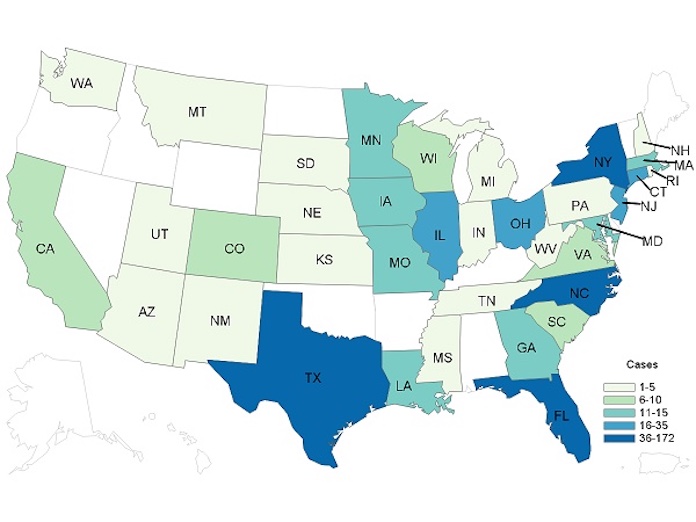The Centers for Disease Control and Prevention (CDC) updated their investigation on the huge Cyclospora outbreak that has sickened more than 1,000 people in the U.S. this summer. As of September 27, 2017, there are 1,054 laboratory confirmed cases in 40 states of people who got sick this year. This is an increase of 23 cases since the last update on September 20, 2017.

At least 592 of these people didn’t report international travel, and got sick on or after May 1, 2017. The case count by state of that group of 592 is: Arizona (1), California (10), Colorado (6), Connecticut (23), Florida (78), Georgia (13), Illinois (17), Indiana (4), Iowa (14), Kansas (2), Louisiana (12), Maryland (12), Massachusetts (14), Michigan (3), Minnesota (13), Mississippi (1), Missouri (13), Montana (2), Nebraska (5), New Hampshire (4), New Jersey (19), New Mexico (1), New York (excluding NYC) (15), New York City (32), North Carolina (48), Ohio (17), Pennsylvania (2), Rhode Island (2), South Carolina (7), South Dakota (4), Tennessee (4), Texas (172), Utah (1), Virginia (9), Washington (1), West Virginia (2), and Wisconsin (9).
No specific vehicle of interest has been identified, and investigations to identify a possible source are ongoing. Officials also can’t say whether these cases are related to each other or to the same food. The most recent case was reported on September 13, 2017.
Previous cases of cyclosporiasis in this country have been linked to imported cilantro, basil, mesclun lettuce, raspberries, and snow peas.
The symptoms of cyclosporiasis include watery diarrhea that can be explosive, loss of appetite, weight loss, bloating, increased gas, nausea, fatigue, and stomach cramps and pain. Some patients may have headache, vomiting, a low grade fever, and body aches. This illness can last for a month or even longer and can recur.
The Cyclospora cayetanensis parasite is endemic in tropical and sub-tropical climates. People usually get sick by traveling in countries where the parasite is common.
The parasite is spread through feces. Infected people shed the unsporulated oocysts in their stools. The oocysts must sporulate, or become infective, a process that can take at least seven days. This illness is not spread person-to-person.
It can be difficult to wash the oocysts off of contaminated produce, especially produce with crenelated or rough surfaces. Cooking destroys the oocyst.
If you have experienced these symptoms, see your doctor. Diagnosing cyclosporiasis requires special labs tests that are not conducted routinely. This illness can be treated with antibiotics.




